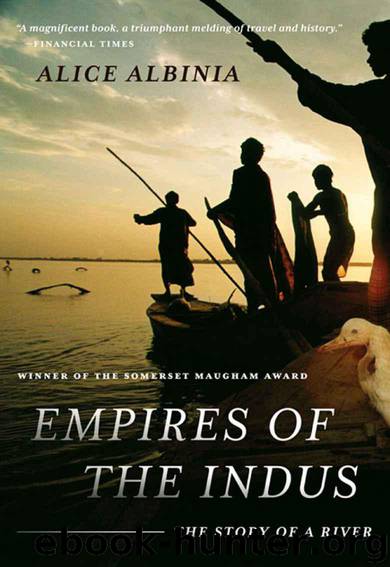Empires of the Indus: The Story of a River by Alice Albinia

Author:Alice Albinia [Albinia, Alice]
Language: eng
Format: epub, mobi
Publisher: W. W. Norton & Company
Published: 2010-03-18T00:00:00+00:00
327 BCE
‘The Indus is bigger than any river in Europe…This was the river which Alexander crossed with his army, and so entered India.’
Arrian, Anabasis Alexandri, c. 145 CE
ALMOST TWO THOUSAND years ago, Plutarch described the meeting between Alexander the Great of Macedon and an Indian boy, ‘Sandracottus’. This child, Plutarch attested, never forgot that the foreign king came ‘within a step’ of conquering India. In fact, Plutarch’s story was a wilful exaggeration of Alexander’s prowess. In 327 BCE, Alexander had barely subdued the Indus valley, India’s namesake. Two years after he returned from India to Babylon he was dead. The string of cities called Alexandria which he had founded in eastern Persia and western India were washed away in the region’s many rivers or repossessed by the locals; the soldiers he had stationed there marched home in long foot-columns; and his empire was divided up between his companions. So imperceptible was Alexander’s impression upon India that none of the residents thought his visit worth recording in such literature as survives. Instead it was young ‘Sandracottus’–Chandragupta Maurya, Ashoka’s grandfather–who by 305 BCE had won back all the land along the Indus that Alexander had taken. It was Chandragupta Maurya who accomplished what Alexander had failed to do, and united India as one empire.
But in Greece, nothing could eclipse the exploits of the ‘world conqueror’. Alexander was too adept at manufacturing his own myth. And India was too marvellous. The tales his companions told on their return–of the country’s gold, elephants and rivers–were the gloss and burnish of the Alexander legend.
When Alexander set out from Greece to conquer the world, his most urgent priority was to better the exploits of his rival, Emperor Darius the Great of Persia, who had invaded ‘India’ two centuries earlier. None of the campaign historians Alexander took with him to India mention Darius, but they were certainly aware of him. A century before, the Greek historian Herodotus had called Darius the discoverer of ‘the greater part of Asia’. He had be come so, Herodotus explained, by despatching a sailor called Scylax to navigate the Indus from Attock (where the Kabul river joins the Indus) downstream to the sea. Scylax, who thus mapped 1,400 kilometres of the Indus, became the first Westerner to describe ‘India’, and gained a reputation as ‘the bravest man in early Greek history’. And Darius, meanwhile, annexed the Indus to his empire.
For Darius, conquering the Indus valley was a lucrative venture. As Herodotus attested in his Histories, the Indus valley was engorged with gold; the natives wore clothes made of ‘tree-wool’, and they paid ‘a tribute exceeding that of every other people, to wit, three hundred and sixty talents of gold dust’. This was enough to spur on any army. It was from Herodotus that Alexander would have heard of the Nile-like crocodiles in the Indus, and it was Herodotus who first compared the Indians and the Ethiopians: both have black skin, he wrote, and black semen. The Alexander historians appear to have written
Download
Empires of the Indus: The Story of a River by Alice Albinia.mobi
This site does not store any files on its server. We only index and link to content provided by other sites. Please contact the content providers to delete copyright contents if any and email us, we'll remove relevant links or contents immediately.
Asking the Right Questions: A Guide to Critical Thinking by M. Neil Browne & Stuart M. Keeley(5774)
Autoboyography by Christina Lauren(5234)
Eat That Frog! by Brian Tracy(4536)
Dialogue by Robert McKee(4400)
Sticky Fingers by Joe Hagan(4197)
Journeys Out of the Body by Robert Monroe(3624)
Annapurna by Maurice Herzog(3467)
Full Circle by Michael Palin(3448)
Schaum's Quick Guide to Writing Great Short Stories by Margaret Lucke(3380)
Elements of Style 2017 by Richard De A'Morelli(3349)
The Art of Dramatic Writing: Its Basis in the Creative Interpretation of Human Motives by Egri Lajos(3067)
Atlas Obscura by Joshua Foer(2961)
Why I Write by George Orwell(2952)
The Fight by Norman Mailer(2940)
The Diviners by Libba Bray(2937)
In Patagonia by Bruce Chatwin(2928)
The Mental Game of Writing: How to Overcome Obstacles, Stay Creative and Productive, and Free Your Mind for Success by James Scott Bell(2908)
Venice by Jan Morris(2573)
The Elements of Style by William Strunk and E. B. White(2473)
